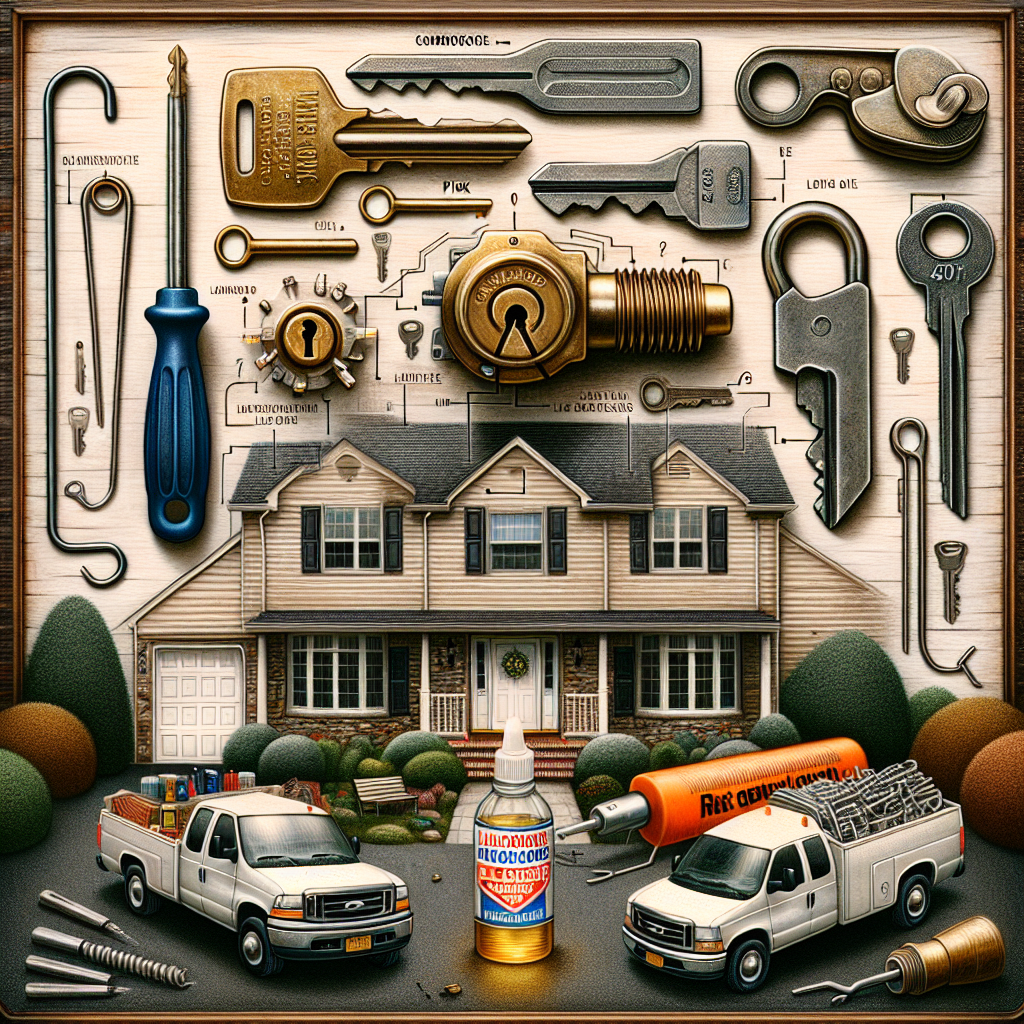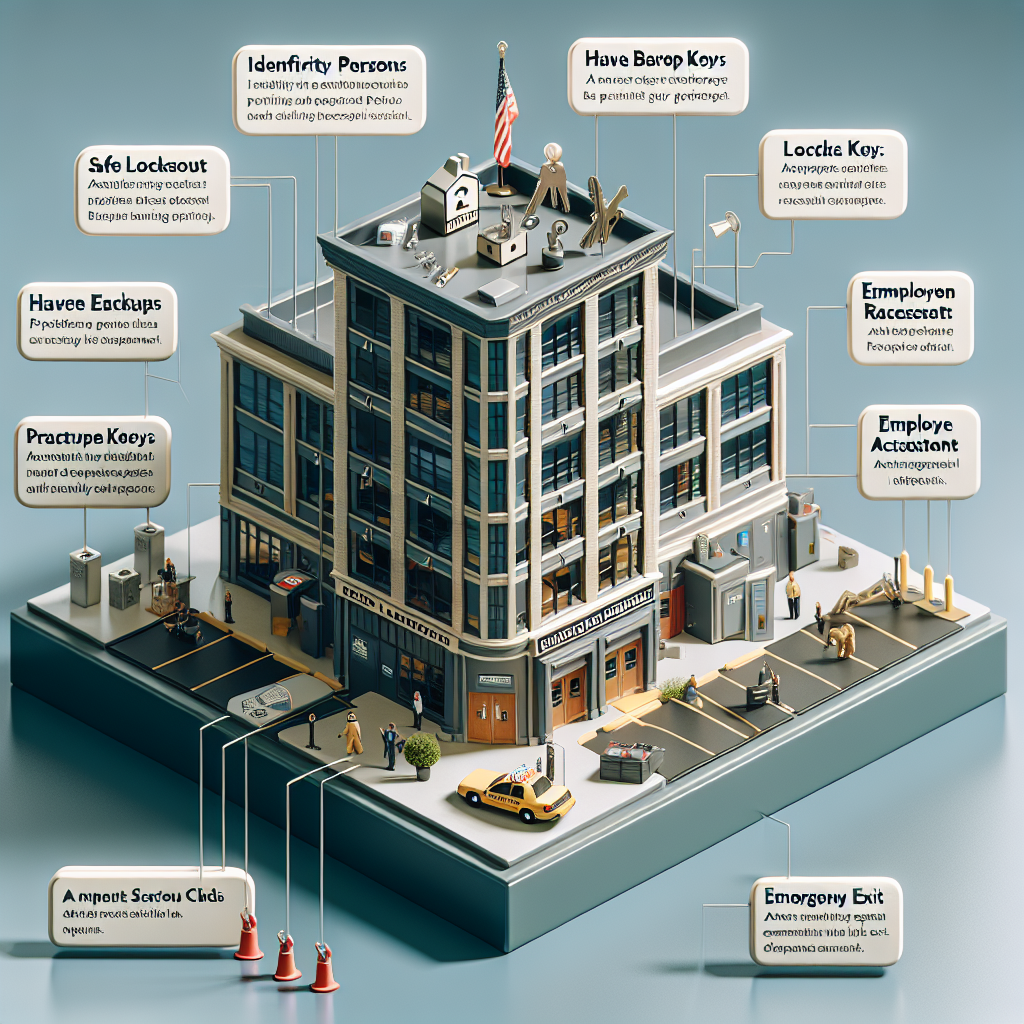As the gateway to our homes and a guardian of our possessions, locks play an integral role in the safety and security of our personal spaces. In Nassau County, where the salty sea air from the Atlantic can fast-track corrosion and the changing seasons impose fluctuating temperatures, the maintenance of these metallic sentinels is not just a recommendation, but a necessity. The impact of this unique environment can compromise the integrity of locks, leading to potential failures that could leave residents vulnerable to lockouts or security breaches. Diligent lock maintenance goes beyond simply keeping your home secure; it preserves the longevity of the mechanisms that stand between your valuables and the outside world.
Recognizing the significance of these pivotal devices, it’s imperative that homeowners in Nassau County arm themselves with a well-curated set of lock maintenance tips, each tailored to address the climatic peculiarities of the region. In the forthcoming section of our article, we will delve into the key takeaways that local residents need to know to keep their locks functioning seamlessly. From the vital importance of regular cleaning to the selection of the right lubricants that will thwart the coastal humidity, these actionable insights will ensure that your home remains an impenetrable haven against the elements, and your locks remain as steadfast as the day they were installed. Stay tuned as we unlock the secrets to maintaining robust and reliable locks.
Key Takeaways
1. Regular cleaning of locks can prevent the buildup of dirt and debris, which can lead to malfunction. Nassau County residents should use a mild soap and water solution to gently cleanse the exterior of their locks, while avoiding harsh chemicals that could damage the lock’s mechanisms.
2. Lubrication is essential for maintaining the smooth operation of locking mechanisms. Use a graphite-based lubricant or a dry lubricant spray on the keyhole and moving parts annually for optimal performance. Do not use oil-based products as they can attract dirt and grit, causing more harm than good.
3. Key maintenance is critical; bent or worn keys can damage locks. If a key is difficult to insert or turn, Nassau County residents should have a locksmith create a copy from the original before wear exacerbates. Avoid using metal key rings that can stretch or wear down the key.
4. Professional inspection and maintenance of locks can greatly enhance home security. Homeowners should consider having a professional locksmith inspect their locks every couple of years, especially after a break-in in the neighborhood or if the lock starts to show signs of wear.
5. For homes in coastal areas like Nassau County, where the air is often humid and salty, investing in locks made from corrosion-resistant materials, such as stainless steel or brass, can be beneficial. This can reduce the frequency of lock replacements due to rust and corrosion caused by the harsh environment.
How Can Homeowners in Nassau County Ensure Their Locks are Well-Maintained?
Regular Cleaning of Locks
Maintaining the cleanliness of your locks is essential to ensure that they function correctly. Dirt, dust, and other particles can accumulate within the lock mechanism, leading to wear and corrosion. Nassau County residents can use a mild soap and water solution to gently clean the exterior of their locks. For the interior, a damp cloth can be used to remove dust from around the keyhole. It’s critical to avoid harsh chemicals or abrasive cleaners that might damage the lock’s finish or internal components.
Lubrication of Lock Components
Lubrication is a crucial element of lock maintenance to prevent sticking and ensure smooth operation. Use a graphite-based lubricant or a dry Teflon spray for best results. These products do not attract dirt or dust, which can clog the lock. Apply the lubricant sparingly into the keyhole and onto the bolt mechanism, and operate the lock several times to distribute it properly. Nassau County homeowners should perform this routine every six months to keep their locks functioning optimally.
Inspecting Locks for Wear and Damage
Over time, locks can suffer from wear and damage due to frequent use and exposure to the elements. It’s important to inspect your locks periodically for any signs of trouble, such as rust, loose components, or difficulty locking and unlocking. If a lock shows significant wear, it may be time to repair or replace it to ensure the safety and security of your home.
Addressing Weather-Related Issues
The coastal climate of Nassau County can cause specific problems for lock maintenance. Humidity and salt in the air can lead to corrosion and rust. Keep an eye on outdoor locks, such as those on gates or sheds, and consider using locks made from weather-resistant materials like stainless steel or brass. It may also be beneficial to add protective covers to shield locks from direct contact with rain, snow, and salt spray.
Key Maintenance
Keys can become bent or worn, causing them not to fit properly in the lock. Homeowners should inspect their keys regularly and replace any that are bent or showing signs of wear. It’s critical to use only the correct key for each lock to prevent damage to the key or lock mechanism.
Professional Lock Inspection and Service
At least once a year, consider hiring a professional locksmith to inspect and service the locks in your home. A locksmith can identify potential problems before they escalate and offer solutions for locks that may not be providing optimum security. This professional service is particularly advised for areas that have experienced break-ins or attempted burglaries, as the locks may have sustained unseen damage.
Updating Locks to Meet Current Security Standards
With advancements in lock technology, Nassau County residents should consider updating older locks to newer, more secure models. Features such as smart locks, deadbolts, and high-security locksets can significantly enhance the security of your home. Consult with a local locksmith to determine the most suitable options for your specific needs and security concerns.
What Numbered Steps Should Nassau County Residents Follow for Effective Lock Maintenance?
- Perform biannual lubrication of all lock mechanisms using graphite-based or dry Teflon products.
- Clean locks regularly with mild soap and water, avoiding harsh chemicals.
- Inspect locks frequently for signs of wear or damage and address immediately.
- Choose weather-resistant lock materials and add protective covers as needed.
- Check and replace worn or bent keys to prevent damage to the lock.
- Schedule annual professional inspections and servicing of your locks from a certified locksmith.
- Stay informed about the latest security features and consider upgrading old locks to modern, more secure systems.
How often should Nassau County residents service their locks?
Maintenance frequency for locks can vary based on usage and environmental conditions, but generally, it is recommended to service residential locks at least once every year to ensure they operate smoothly and maintain security.
What is the best lubricant to use on locks in Nassau County?
For locks in Nassau County, a dry lubricant such as graphite is often recommended because it does not attract dirt and grime, which can cause the lock to become sticky or jammed over time.
Can humidity affect the functioning of my locks?
Yes, Nassau County residents may find that high humidity levels can cause locks to stick or swell. Using a moisture repellent or maintaining a dehumidified environment can help prevent these issues.
What are the signs that a lock needs maintenance?
Signs that a lock may require maintenance include difficulty turning the key, a key getting stuck, or noticeable rust or corrosion on the lock itself.
Should I try to repair a faulty lock myself?
While minor issues such as lubrication can be handled at home, more complex repair work should be done by a professional locksmith to avoid further damage to the lock.
How can I prevent my locks from rusting?
To prevent rust, regularly clean your locks with a damp cloth and apply a protective lubricant suited for metal components. Avoid using water-based products as they can promote rusting.
Are electronic locks easier to maintain than traditional locks?
Electronic locks typically require less physical maintenance but still need regular battery replacements and software updates to ensure proper functionality.
Is it necessary to replace locks after losing keys?
While not always necessary, it is often recommended to either replace the locks or rekey them as a precautionary measure against unauthorized access.
How can I maintain the locks on my salt-air exposed Nassau County home?
Homes exposed to salt air require more frequent cleaning and lubrication due to the corrosiveness of the salt. Stainless steel locks are often recommended for these environments.
What professional lock maintenance services are available in Nassau County?
There are numerous locksmith services in Nassau County that offer professional lock maintenance, including cleaning, lubrication, repairs, and security assessments.
Final Thoughts on Lock Maintenance Tips for Nassau County Residents
As a Nassau County resident, being proactive about lock maintenance not only ensures the smooth operation of your locks but also strengthens the security of your home. Understanding the local climate considerations, such as humidity and salt-air exposure, and tailoring your maintenance practices accordingly, can prolong the life of your locks and save you the cost and inconvenience of premature replacements. Regular servicing, either done by yourself or by a professional, is a small investment in the protection and peace of mind that quality, well-maintained locks provide.
Regardless of whether you choose traditional or electronic locks for your home, staying vigilant about regular upkeep and seeking professional advice when in doubt can help avoid unexpected lockouts and potential security breaches. Maintaining your locks is an essential part of home care in Nassau County, and by following the tips discussed, you will be well-equipped to keep your home safe and secure throughout the year.







